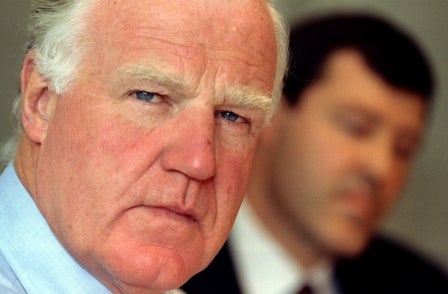
Former managing director and deputy chairman of Daily Express Newspapers Sir Jocelyn Stevens (pictured, Reuters) has died, aged 82.
A Guardian obituary described him as "perhaps the last of the old-style Fleet Street bosses, revelling in a reputation for brusqueness and bullying, during the chaotic and corrupt final days of boozy incompetence and print union power, before the publishing revolution of the late 1980s".
He launched a career in journalism and publishing after serving in the Rifle Brigade, reports the Express.
The grandfather of model Cara Delevingne, he bought society of magazine Queen in 1957 at the age of 25 and also funded pirate station, Radio Caroline.
According to The Daily Telegraph, Stevens was made PA to Beaverbrook Newspapers' Sir Max Aitken in 1968 and later managing director of the Evening Standard, which was owned by the company along with the Express titles.
He was then made managing director of the Daily Express in 1971. He worked for the Express between 1972 and 1981, in which time he was said to have turned down the editor's role twice.
In 1974 he was made managing director of Beaverbrook Newspapers and was deputy chairman when the Express was bought up by Trafalgar House, according to The Guardian.
After helping to found the Daily Star in 1979, he was sacked in 1981.
After journalism, he went on to work for the Royal College of Art and English Heritage.
The Independent said Stevens – dubbed "Piranha Teeth" by Private Eye – had "spent his career saving lost causes and lame ducks, beginning with Queen magazine, moving on to the Evening Standard, the Daily Express and the Royal College of Arts, and most recently English Heritage".
The Daily Telegraph's obituary said: "Stevens was at his best in a crisis, for his style of management was based less on his intellect than on the overpowering force of his personality. He carried with him an air of impatience and, though capable of great charm, he did not shy from ruthless, even brutal, behaviour where necessary…
"Indeed, at times there appeared to be no form of exercise that gave him greater pleasure than taking an axe to those he perceived as dead wood. Stevens was, par excellence, a sacker — he once dismissed 11 professors from the RCA in an afternoon — and there clustered about him a fund of oft-repeated stories about his towering rages.
"Such was his reputation for belligerent cost-cutting that when he was appointed chairman of English Heritage in 1992, one commentator described it as 'like putting Herod in charge of childcare'. It was an image in which, in public at least, Stevens revelled."
Email pged@pressgazette.co.uk to point out mistakes, provide story tips or send in a letter for publication on our "Letters Page" blog
